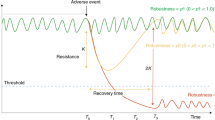Abstract
Two new important developments in environmental and resource economics is presented—non convex dynamics of ecosystems and wealth as an indicator of sustainable development. Non convex dynamics imply existence of resilience, that is the robustness of systems to withstand exogenous perturbations. Resilience can be regarded as an insurance against flips of the system into different basins of stability. Sustainable development, according to the Bruntland report, is the provision of productive resources to future generations to make it possible for them to live as well as the present generation. Thus, the value of changes in productive assets is therefore an index of whether an economy is on a sustainable path or not. Resilience can be regarded as one such productive asset and the paper discusses how one can define the value of this asset.
Similar content being viewed by others
References
Asheim G, Weitzman M (2001) Does NNP growth indicate welfare improvements?. Econ Lett 73(2): 233–239
Aniyar S, Mäler K-G (2006) Inclusive wealth and sustainable development. Draft, Beijer International Institute of Ecological Economics
Arrow K, Dasgupta P, Mäler K-G (2003) Evaluating projects and assessing sustainable development in imperfect economies. Environ Resour Econ 21(2): 217–255
Arrow K, Dasgupta P, Goulder L et al (2004) Are we consuming too much. J Econ Perspect 18(3): 147–172
Daily, GC (eds) (1997) Nature’s services: societal dependence on natural ecosystems. Island Press, Washington
Dasgupta P, Mäler K-G (2000) Net national product, wealth, and social well-being. Environ Dev Econ 5(2): 69–93
Dasgupta P, Mäler K-G (eds) (2003) The economics of non-convex ecosystems. Kluwer Academic Publishers, Dordrecht
Ecosystems and Human Wellbeing, Synthesis Report (2005) Millennium ecosystem assessment. Island Press, Washington
Integrated Environmental and Economic Accounting (2003) Final draft. United Nations, New York
Koopmans TC (1960) Stationary ordinal utility and impatience. Econometrica 287–309
Koopmans TC, Diamond PA, Williamson RE (1964) Stationary utility and time perspective. Econometrica 32:1–2
Mäler K-G, Li C-Z, Destouni G (2006) Pricing reslience in dynamic economy-environment system: a capital theoretic approach. Beijer discussion papers, No. 208
Steffen W (ed) et al (2003) Global change and the earth system. Springer, Berlin
System of National Accounts (1993) United Nations. New York
Tzouvelekas E, Vouvaki D, Xepapadeas A (2006) Total factor productivity growth and the environment: a case for green growth accounting. Beijer discussion papers, No. 206
Weitzman M (2006) On the welfare significance of national product in a dynamic economy. Quart J Econ 90: 152–162
Xepapadeas A (2005) Economic growth and the environment. In: Mäler V (ed) Handbook of environmental economics, vol. 3. North-Holland, Amsterdam
Author information
Authors and Affiliations
Corresponding author
Rights and permissions
About this article
Cite this article
Mäler, KG. Sustainable Development and Resilience in Ecosystems. Environ Resource Econ 39, 17–24 (2008). https://doi.org/10.1007/s10640-007-9175-7
Accepted:
Published:
Issue Date:
DOI: https://doi.org/10.1007/s10640-007-9175-7




